The Background Story
Most people don’t know it, but I used to be a chubby kid. Like a 28% body fat, husky-jean wearing chubby kid. I used to be that kid that wore his t-shirt in the pool (like I was fooling anyone..) and a big highlight of my summer was defending my championship in the big splash contest at the local pool. Then, one random day in 7th grade P.E., we had the local performance academy guys bring some weights to our school and as cheesy as it sounds, my life was changed forever. I instantly fell in love with lifting weights and I used this new love of strength training to combat my bad diet for a few years, but it wasn’t until my last couple years in high school that I really dove into nutrition and began to see my body really change. My first day of college football in August 2004, I weighed in at 204lbs and 7.6% body fat. To this day, I still maintain a body fat between 8-12% at a body weight of 240-250lbs.
With all that being said, I am not a Registered Dietitian, nor do I have any fancy letters behind my name on my business card. I took a handful of nutrition classes in college, but I have acquired most of my knowledge from about 14 years of non-stop reading and experimenting around with my own diet to come up with a diet that gives me the best performance in my workouts and the best, healthiest body I can have. Healthy to me is; When I wake up in the morning do I feel good? Free of stomach pain, headaches, joint and muscular pain. Are bowel movements normal? Do I have sustained energy throughout the day, and can I fall asleep at night? Most people may associate the term “health” to blood test results and other medical lab results, but for me those tests are just tools that help measure health. I rely heavily on my own personal evaluation system to know if something isn’t quite right.
The goal of this blog is not to tell you to stop eating and change everything you’re doing, but to inform you of a few changes I have made in my diet that I have found very beneficial.
My Philosophy
My philosophy on nutrition is pretty simple. I try and eat foods that have a short ingredient list and stay away from foods that I know are loaded with refined sugars and preservatives. In my opinion, the human species evolved in this world by eating meats,grains,nuts, fruits and vegetables. Did cavemen have pre-packaged energy bars or packaged turkey that had a shelf life of anywhere from a couple weeks to a couple years? Absolutely not. I continue to argue that the best diet is one that is simple, matches the needs of your activity levels, and steers clear of preservatives, corn syrups, and other highly (genetically) modified ingredients.
In my opinion, the problem with the American diet is that we love carbs and sugars and very few people have told us this is what is going to kill us. Instead, we have been told that fat is the root of all evil and avoid it at all costs, so instead of eating meat, we suck down dinner rolls, pizza, pastas, and fried everything, thinking we aren’t doing any harm. I eat red meat 3-5x a week and every meal that I consume has some sort of animal protein in it. Some people may say that can’t be healthy. To you I say: I just got my blood work taken last week and my Total Cholesterol was 135 (normal 125-200), Triglycerides 76 (Normal 40-184) , LDL Cholesterol 89 (Optimal <100), and resting glucose 79 (normal 70-100). I don’t know where that ranks nationally, but i do know the national average LDL (bad cholesterol often “linked” to over consumption of animal meats) is 120, and when reviewing these numbers with my Doctor, he handed me my test result papers and said everything looked great.
Proteins:
My take on protein is very simple. I try to get 1 gram of protein per pound of body weight. I weigh 245lbs so I try and consume around 245g of protein a day. If my workouts are a little harder or a little easier I will modify this number accordingly. If I’m trying to bulk I will up this number to 275-300g. The primary sources I use for protein are animal meats (fish, pork, chicken, and beef), eggs, and whey protein powder. I try to ingest 20-30g of protein every 3-4 hours if possible. I am not super strict on myself and just try to make sure my protein intake is high to support my workout and muscle building demands.
Carbs:
Carbs can be a double edged sword. They are key for muscle recovery and glycogen replenishment, but if over-consumed they can lead to a big time gain in excess body fat. The problem is most Americans over-consume carbs constantly. I utilize carbs in small quantities at certain times throughout the day. I will have 20-40g of quality carbs (quality bread, oatmeal) in the morning, 80-100 grams post workout ( I workout mid-morning) from whatever carb source I want, maybe another 30-40g with my lunch, and 30-50g in the evening with my dinner to help ensure I am fully restored for the next days workout demands. That is a total of around 200-300g carbs a day spread out in 4-5 servings. The RDA (which recommendations I typically strongly disagree with) recommends the average person consume 300 grams of carbs a day. If you are not working out or par-taking in pretty rigorous physical activity, you do not need near this many carbs. On days that I do not workout I try and keep my carb intake at 50-150 grams. I don’t need a bunch of carbs in my system if I haven’t done any sort of physical activity that would require glycogen (carb/sugar) restoration. Makes perfect sense to me.
Fats:
Fats get the worst rap by far when it comes to how we look at macro-nutrients. Everywhere we go we see products that say “Reduced Fat” and “Half the Fat”. I will never buy one of these products again. If they take the fat out of the product, but it still looks, tastes, and feels the same, how do they do it? They do it by removing the fat and likely adding some highly modified syrup, paste, or gel to replace the fat. Our body is made to utilize and digest fat. Simply look at our history in evolution. Did we survive as a species by limiting our consumption of animal fats? Yeah right. Humans are hunters and gatherers by nature. Back in the day, we found the nearest animal, killed it, and ate it…likely ALL of it. Fat gives us long sustained energy, slows digestion, regulates hormones, and a whole bunch of other great stuff. There is a caveat however…not all fats are created equal. I stay away from anything that would be called “processed fat”. This includes things like cookies, cakes, modified dairy products, cooking oils other than olive and coconut oil, modified butters, and other common baking ingredients. I get my fats from natural occurring sources like nuts, meats, and natural dairy sources like whole milk and grass-fed organic butter. I have been eating a moderate-high animal fat diet for about 3 years and have never felt better, and have the medical records and tests to prove it.
Sugar:
Sugar will be the death of America. Mark my words. We live in a society where no one says anything about sugar, but cringes at the sight of fat. Sugar is slowly killing America and will continue to do so until the government changes its stance on one of the most consumed ingredients in the American diet. I could write a whole blog post on why the government diet recommendations are total crap, but I’ll save your time for now. Sugar has very few benefits and a page worth of harmful side-effects. Every time you eat sugar you create an insulin response, which is designed to take the sugar out of your blood and drive it to the muscle or liver for glycogen restoration. Unfortunately, if you don’t need any glycogen restoration in your liver or muscle, this sugar is taken and stored right in your belly, butt, or thighs.
Sugar is literally in about everything. Look at the sugar content of your cereal, keeping in mind 1 packet of sugar is 5 grams. Your 1 cup (most people consume 2-3 cups in a bowl) of Fruit Loops has 15 grams of sugar in it. Take that times 2.5 to match up with the size of bowl you are probably eating, and now you have 38 grams of sugar in your morning cereal. That’s the equivalent of 7 sugar packets on top of your morning cereal. Seriously people?! Look at that yogurt you think is so healthy. Does it have some health benefit? Yes. Does it have a ton of sugar? Most Likely. Sugar is in literally everything that we think tastes good and is now being used in many so called “healthy” foods. All these so called health bars and fancy fruit juice drinks are total sugar bombs and should be avoided at all costs. The only time I utilize sugar is post workout to help stimulate an insulin response or on the occasional cheat meal dessert. Outside of that I don’t consume a meal that has more than 10 grams of sugar in it.
Comparison Time
I recently went to Kroger and took the time to snap some pictures of the labels of the products I buy and put them next to the label of the products I felt the average American might buy. You will be surprised by how many ingredients and refined crap ingredients have been thrown into your everyday meal items.
Breads
Breads can be a tricky item. We usually think of bread as a pretty healthy item, which is usually a safe assumption…well in the past it was. Unfortunately, companies have found ways to cheapen bread production and enhance its shelf life by loading it with ingredients that sound like they should only be found in a chemistry text book. I only buy locally made bakery bread, which has 4-6 ingredients. I had the luxury of making bread with my grandma as a kid and I can recall us laying out about 4 basic ingredients to make 2-3 loafs of homemade bread, not setting up the at-home chemistry kit. The bread I buy is moldy in 5-7 days, which is great, because that means it’s preservative free. I highly recommend you look into a local bakery when it comes to buying bread. I am lucky and I live in a town where we have a great local farmers market so I can get these products, usually in a organic type product, relatively easy. They will cost you a little more however. I pay about $4.50 for a loaf of bread. I do not flinch at the price knowing I am investing in my body and self well-being. Compare this to the medical bills you will likely face down the road eating crappy food and a few dollars doesn’t even compare!
Butter
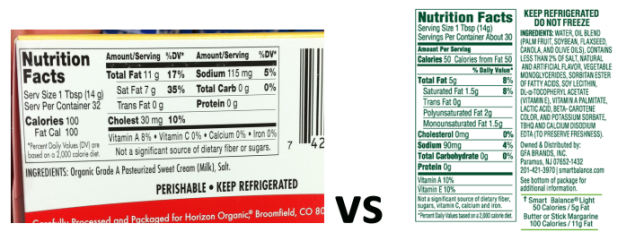
Butter has been the victim of criticism practically it’s whole life. Butter, the kind like “I can’t believe it’s not butter” is a health nightmare. These refined butters are loaded with a mix of low-grade oils and cheap ingredients to make them seem more healthy. I eat butter daily. The difference is I only buy organic or grass-fed butters. A healthy fat is a great source of energy, but it is imperative to make sure it is an organic/grass fed butter. When an animal ingests toxins, these toxins are likely stored in the fat of the animal. These toxins are passed onto us humans via the fat in the animal, which is why I try to always buy grass-fed, hormone free animal product whenever possible. An item such as butter, which is almost all fat, needs to come from an animal that had a natural animal diet, not force-fed grain or other popular cheap feeding products. Cows are meant to be pasture animals and walk around and chew on grass and other random vegetation growing in the field, not suck down some leftover corn meal. Meats and butters from grass-fed cows will have a stronger nutrient profile based simply on the diet of the cow. Grass-fed products will have a better omega-3 fat content (that’s the healthy one) than grain fed anything. Fat is not evil people, stop buying into that myth!
Peanut Butter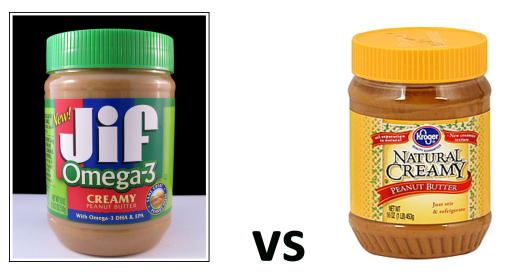

When it comes to peanut butter, there is no other option than to buy the natural variety. In my comparison of labels here with “Jif Omega 3” vs Kroger Natural, which (The Jif) people would think is very healthy by it’s fancy label, you can see there is quite the discrepancy when it comes to the ingredient list . Peanut butter should be a simple product having 1-2 ingredients: Peanuts and Salt. If your peanut butter has a bunch of oils, especially partially hydrogentated vegetable oils, THROW IT AWAY. Those partially hydrogenated vegetable oils are Trans Fat and are horrible for you. Our silly Government has allowed companies to feed us trans fat as long as they don’t actually call it trans fat. The Government doing something scandalous? Who would have guessed!
Cereal
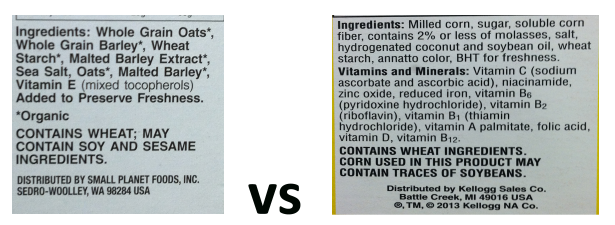
Cereal is another item that I have honestly just eliminated from my diet. There are a few decent choices, but cereals have been cheapened so bad I don’t even mess with them. They are full of corn byproducts and lack any real nutritional value in my opinion. They are usually just carbs and sugar mixed together with milk. If I want that, I will just swing by Dairy Queen on my way to work. You can make some decent choices, again just avoid cereals that are loaded with sugar and cheap filler oils (soybean, fructose). If you want something nutritious for breakfast opt for some oatmeal…and not the pre-packaged sugary crap. I’ll discuss that next.
Oatmeal

Oatmeal is a great product. It is a slow digesting healthy carbohydrate source that is great for sustained energy. The problem with oatmeal is we often opt for the pre-packaged flavored stuff. These are awful. Again, by simply comparing the ingredient list it shown above it is obvious which one is better for you. A grain that grows naturally in a field should not have an ingredient list longer than 1 item. If your oatmeal contains soybean oils and other chemical sounding words, throw it away. If you need some flavor in your oatmeal, opt for some brown sugar and a few select berries. This will be 100 times more healthy than the pre-packaged, preservative loaded kind.
Yogurt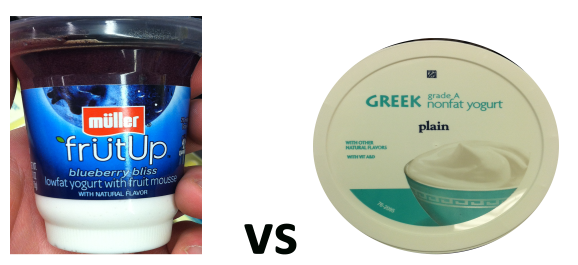

Yogurt. The food that everyone thinks is healthy, but unfortunately it’s probably doing more harm than good for you and your health. Yogurt, in its plain, unflavored environment, is a great product. The problem is, nobody eats yogurt in that state because it tastes like what it is; bacterial fermented milk. So instead, we buy yogurt that tastes like dessert and think we are eating the same healthy yogurt we read about all the time as a “Power-Food”. When that good tasting stuff is added, so is tons of sugar and preservatives. Yogurt can easily be made homemade, look it up, it’s kind of intriguing. If you are a yogurt lover, try buying the unflavored stuff and add your own fruit to it, but shy away from Yoplait and all that “Fruit On the Bottom” stuff. With that stuff you are basically throwing a couple spoonfuls of Jelly into your yogurt and calling it healthy. Ummm not quite.
Deli Meats

Deli meats are something I used to consume on the regular until about 2 years ago. I always thought they were kind of strange based on the fact I have had thanksgiving type turkey about 100 times and have yet to have a turkey sandwich that resembles anything close to that type of meat. Deli meat is a weird product. Its often a cold pressed mix of meat and chemicals which is processed and shaved to resemble real meat. Kind of like chicken nuggets in a sense. It is meat yes, but likely not 100% meat, and not very high quality. For this reason, I have cut subway and other sandwich places out of my diet and opted for real meat meals instead. If you want a meat sandwich, use some leftovers and leave those Oscar Mayer packages on the shelf.
Fish

Fish is another food that we instantly think is healthy, but let me shoot you some interesting facts quick. The majority of fish found on the shelves in the U.S. comes from China (as shown above). China has the lowest fishery standards in the world. Often times fish are farmed in heavily polluted pond waters and just recently there was a recall for Tilapia from China because it had so many “Veterinary Drugs” in it that it was not safe for human consumption. If you saw the water these fish were raised in you would not touch them, let alone eat them. Often times the fish’s meat is far from the color it should be, so the fishery will dye the fish’s meat before the sale to trick the consumer. A lot of “Farm Raised Salmon” is very low quality meat. Also, many of these farm fish are fed a diet of “Pellets”, which are often made up of the feces of other animals. Yum! If you are a big fish connoisseur just know that not all fish are equal. Always opt for “Wild Caught” and never eat “Farm Raised” anything when it comes to fish. Farm raised means the fish was kept in a nasty pond or run-off tank and fed the cheapest feed possible. At least if it is “Wild Caught” it likely had a diverse natural diet and will hold a stronger nutrient profile. The best option is to buy fish that is Wild Caught in U.S. waters. Fish like Wild Caught Sockeye Salmon are among the best available.
Juice

The Juice vs Fruit debate is one I seem to always be having, especially with the athletes I coach here at Ohio. Juices have been sold as a great way to get the nutrient of the fruit, without having to go through the hard work of peeling and messing with the fruit. The problem is many of nutrients in the fruit are found in the actual fruit itself, not just its juice. Fruit juice can be loaded with sugar and has few health benefits compared to consuming the whole fruit. Here’s an interesting tid-bit from a recent Harvard School of Public Health Study: “People who ate at least two servings each week of certain whole fruits — particularly blueberries, grapes, and apples — reduced their risk for type 2 diabetes by as much as 23 percent in comparison to those who ate less than one serving per month. Conversely, those who consumed one or more servings of fruit juice each day increased their risk of developing type 2 diabetes by as much as 21 percent. The researchers found that swapping three servings of juice per week for whole fruits would result in a 7 percent reduction in diabetes risk.” Need I say more? Leave the juice on the shelf and buy the actual fruit instead.
Pop/Tea
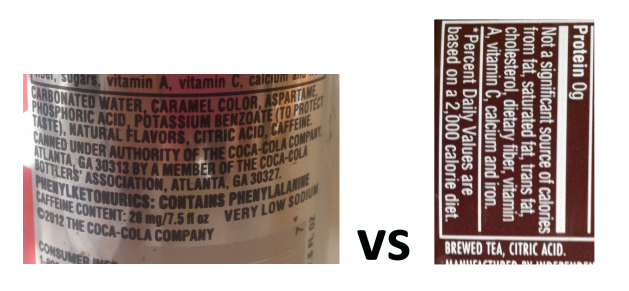
This is my last comparison. It shouldn’t take much to sell you that tea is better than pop. I’m not talking about sweet tea here. I’m talking about all natural unsweetened tea. Tea has a long list of benefits including a strong antioxidant profile which is key in maintaining good health. Pop has become chemicals in a can. After the first ingredient shown above on the Diet Coke label I don’t even know what I’m looking at? Maybe a label for a pack of fireworks or some other type explosive? One thing to be cautious of when drinking tea is that it is not loaded with sugar (Sweetened). If you need a little sweetness add a few grams of sugar or a lemon. Also, try and find real brewed tea, not bottled if possible.
Final Thoughts
In closing, I hope that this article at least opened your eyes to a few of the crazy things that are going on with our current U.S. Food situation. We are in the process of creating a monster by allowing companies to cheapen our food, lower its nutrient profile, yet still sell it at the same or increased price and advertise it as healthy or even healthier than ever. The fact that we are allowing this to happen is sickening. Profit has been put ahead of our health. Another classic case of American Greed: Sure make money….it doesn’t matter how or who it affects. I’m not going to go on political rant, but something must be done. It seems we have a “Walk to Cure Everything” event every other weekend these days, when the first step in preventing many of these diseases that we are “walking” for, is to stop eating crap and clean up your diet. We “Walk” to cure diabetes when you can improve and eliminate your chances of Type 2 diabetes by simply monitoring your carb and sugar intakes. We need to stop Walking and start Talking to cure some of these simple issues that are beginning to become a preventable epidemic in our society.
The human species didn’t evolve by eating the cheapest and lowest quality food we could find. In fact we did the opposite, so why get away from the standards that got us here in the first place?!
-ZB
Twitter: @zbrulet
E-Mail: brouille@ohio.edu




Deanna Jebelean
January 8, 2014 at 11:02 am
I laugh at people who try to tell me to eat Tilapia. If only people knew that Tilapia is farm grown and feeds off the poop of other fish. No omegas, fatty acids…nada. Salmon is the way to go!
Great article.
Beth Brootality
January 10, 2014 at 8:16 am
It’s sad that I read this after doing my own independent study (and being a fat kid myself) and wonder how this just isn’t common sense. But then I remember the cheesy phrase.. “Well common sense ain’t that common, now is it?!”
Nick
April 18, 2014 at 3:56 pm
Great article, with solid advice that clearly comes from years of personal experience. Check the labels folks.. fewer ingredients the better. If u see the word “hydrogenated”, if an ingredient looks like it belongs in a science text book, or if “sugar” is one the first 4 ingredients listed, dont buy it.